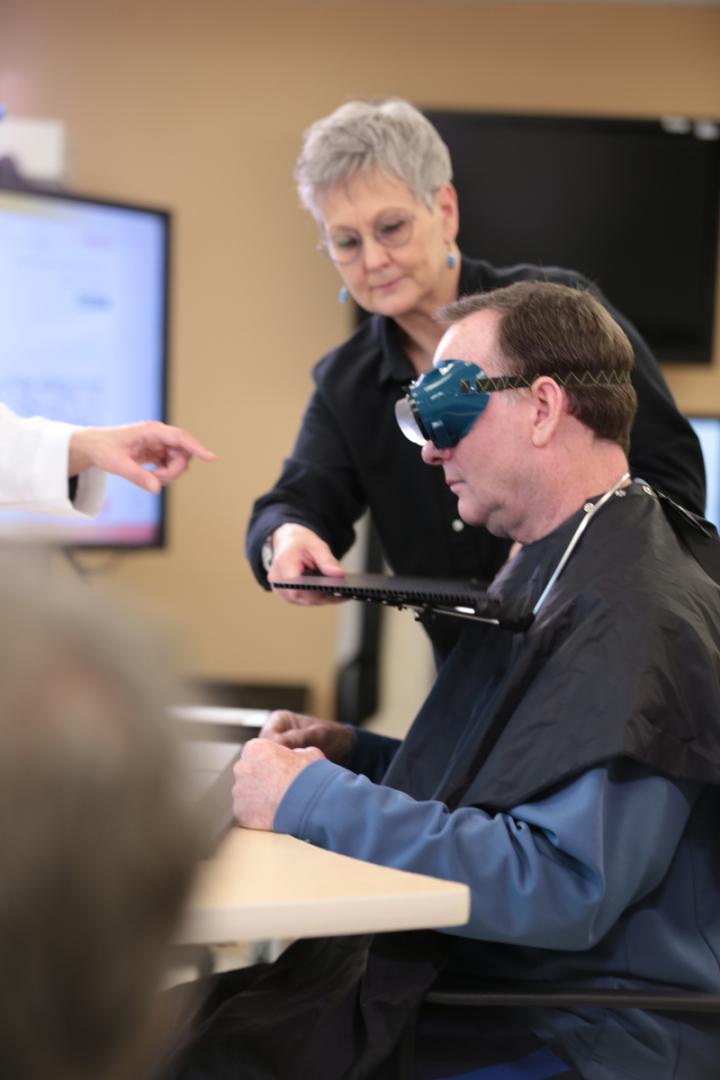Inpatient rehabilitation is shown to be effective, and ample opportunities exist to facilitate optimal outcomes; experts identify innovative approaches to improve care

Credit: Kessler Foundation/Jody Banks
East Hanover, NJ. May 24, 2021. A recent qualitative study of rehabilitation professionals caring for people with spatial neglect enabled researchers to identify interventions to improve rehabilitation outcomes. Experts reported that implementation of spatial neglect care depends on interventions involving family support and training, promotion of interdisciplinary collaboration, development of interprofessional vocabulary, and continuous treatment and follow-up assessment through care transitions.
The article, “Barriers and Facilitators to Rehabilitation Care of Individuals with Spatial Neglect: A Qualitative Study of Professional Views” (doi: 10.1016/j.arrct.2021.100122) was published online in Archives of Rehabilitation Research and Clinical Translation on March 31, 2021. It is available open access at https:/
The authors are Peii Chen, PhD, and Jeanne Zanca, PhD, of Kessler Foundation; Emily Esposito, MS, of University of California, Riverside; and A.M. Barrett, MD, of Atlanta VA Health Care System and Emory University School of Medicine. Drs. Chen and Zanca also have academic appointments at Rutgers New Jersey Medical School.
After a stroke or other type of brain injury, many people experience spatial neglect, a disabling complication that disrupts a person’s ‘internal GPS’, causing them to have difficulties in navigating the environment. As a result, people may have trouble with balance, attention span, reading, memory, and navigation, and are at higher risk for injuries caused by falls, collisions, and other accidents. Spatial neglect contributes to prolonged recovery and poor rehabilitation outcomes.
To understand this problem, researchers conducted a qualitative study to ask rehabilitation professionals what challenges and helpful factors they encounter as they provide treatment to people with spatial neglect. In six focus group sessions with 15 occupational therapists and 14 physical therapists, all of whom treated patients with spatial neglect in a rehabilitation hospital system, researchers learned that while a range of barriers need to be addressed, ample opportunities exist to improve spatial neglect rehabilitation.
The therapists reported having support of peers and senior faculty, other clinical and service staff, and the management leadership. Spatial neglect care was facilitated by access to many if not all facility and equipment resources (e.g., specific treatment devices, availability of private space, feasibility of rearranging the physical setup of the room), a flexible schedule to meet individual patients’ needs, the freedom to try new treatment approaches, and various channels to gain knowledge (e.g., grand rounds, journal clubs, and collaborations with researchers).
Successful treatment for spatial neglect also depends on patient and family-related factors as well as insurance reimbursement. “Increasing patients’ self-awareness of their own deficits and improving their engagement and participation in therapy is an important first step in improving treatment outcomes,” said lead author Dr. Chen, senior research scientist at the Center for Stroke Rehabilitation Research at Kessler Foundation. “Supportive family members are also key facilitators to successful rehabilitation. Having an engaged, informed, and prepared caregiver can have enormous benefit.”
“By taking steps to detect spatial neglect and intervene early, rehabilitation facilities can help individuals recovering from stroke get maximal benefit from their stay,” concluded Dr. Chen. “Ensuring continuity of care through transitions and supporting patient education and continuing education for therapists will contribute to improvement in long-term outcomes after stroke.”
Funding sources: Supported in part by a grant from the National Institute on Disability, Independent Living, and Rehabilitation Research (NIDILRR grant no. 90SFGE0001); Wallerstein Foundation for Geriatric Improvement.
Learn about tools for detecting and treating spatial neglect: Kessler Foundation Learning Center (kflearn.org)
About Kessler Foundation: Kessler Foundation, a major nonprofit organization in the field of disability, is a global leader in rehabilitation research that seeks to improve cognition, mobility, and long-term outcomes, including employment, for people with neurological disabilities caused by diseases and injuries of the brain and spinal cord. Kessler Foundation leads the nation in funding innovative programs that expand opportunities for employment for people with disabilities. For more information, visit KesslerFoundation.org.
For more information, or to interview an expert, contact Carolann Murphy, 973.324.8382, [email protected].
###
Media Contact
Carolann Murphy
[email protected]
Related Journal Article
http://dx.




